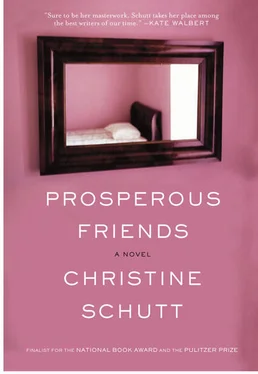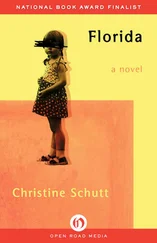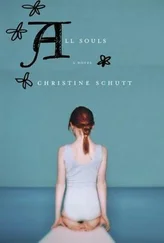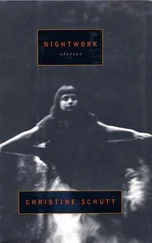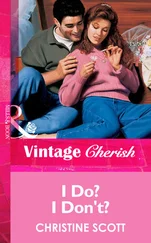Christine Schutt - Prosperous Friends
Здесь есть возможность читать онлайн «Christine Schutt - Prosperous Friends» весь текст электронной книги совершенно бесплатно (целиком полную версию без сокращений). В некоторых случаях можно слушать аудио, скачать через торрент в формате fb2 и присутствует краткое содержание. Год выпуска: 2012, Издательство: Grove Press, Жанр: Современная проза, на английском языке. Описание произведения, (предисловие) а так же отзывы посетителей доступны на портале библиотеки ЛибКат.
- Название:Prosperous Friends
- Автор:
- Издательство:Grove Press
- Жанр:
- Год:2012
- ISBN:нет данных
- Рейтинг книги:5 / 5. Голосов: 1
-
Избранное:Добавить в избранное
- Отзывы:
-
Ваша оценка:
- 100
- 1
- 2
- 3
- 4
- 5
Prosperous Friends: краткое содержание, описание и аннотация
Предлагаем к чтению аннотацию, описание, краткое содержание или предисловие (зависит от того, что написал сам автор книги «Prosperous Friends»). Если вы не нашли необходимую информацию о книге — напишите в комментариях, мы постараемся отыскать её.
Prosperous Friends
Prosperous Friends — читать онлайн бесплатно полную книгу (весь текст) целиком
Ниже представлен текст книги, разбитый по страницам. Система сохранения места последней прочитанной страницы, позволяет с удобством читать онлайн бесплатно книгу «Prosperous Friends», без необходимости каждый раз заново искать на чём Вы остановились. Поставьте закладку, и сможете в любой момент перейти на страницу, на которой закончили чтение.
Интервал:
Закладка:
Shuuuuuush was all she said when she came back to their bed. She put her hand on his shoulder, touched his back, though they both knew by now he couldn’t or wouldn’t — and she?
*
She read about the greater sorrows of others caught in civil wars or genocides, their ghoulish solutions to starvation — in this book, catching small birds and biting off their heads, eating feathers, twiggy claws. The warm dead made use of. Would she, so fortunate, do anything to save herself? Shoes, blankets, warmed eggnog with brandy. The granite stoop she sat on was no longer in the sun and the air was cold off the ocean. How could she move past Rwanda to mulled wine and apples, but she was doing just that when Ned emerged from yet another afternoon spent looking too closely at the wall. She knew his disappointed face.
“What?” he asked.
“Nothing,” she said. “It’s getting cold out. I was about to go inside.”
“I’ve been inside all day,” he said, and he promised he would take only a short walk so they could decide on dinner.
*
The sky, Ned saw, was an ordinary blue, and the sunset was minor, and where they lived and how they lived was small. That was dinner. And after dinner more of what he was doing — small again, an essay on his mother and California and grief, for which he would be paid a modest figure. The work didn’t seem worth the trouble, but he might have a memoir. He wrote after dinner, or at the least he sat in the room where he said he wrote until well past whenever Isabel had gone to bed.
She found him later on the granite stoop, looking out at the dark under a close sky — no moon, no shadows, cool, wet air. She went back into the house and found a blanket and brought it outside.
“Sit close,” he said, and she moved closer.
Evil stories begin in basements with experiments and rats, but his own story begins under an umbrella, poolside with his mother in La Jolla. Pet, his mother, furiously ageless, looked spotty but smelled new. Empty travel, small depressions. The bent-over, boneless, sunk way she sat at the end: I have a slight case of cancer. His mother, poolside in La Jolla, was speaking of what would shortly kill her. Was there a dog at her feet?
Old pugs are ugly without exception — fat, gray, rumpled — and Crackle, the last of three (Snap and Pop were dead), had cataracts and farted.
They are all dead now, the dogs and Pet.
Was his mother a beauty? She must have been. Her hands at the end were translucent and barbed. He wanted to take hold of her hands and break them in his own, but he feared being cut. The sight of his own blood made him queasy, though bleeding and being bled were Pet’s terms when talking about the upkeep of the La Jolla house and taxes. I was hoping for a little comfort?
“The blight of being conditioned for luxury without the means.” Ned was quoting somebody here, but it applied to her, Ned’s mother, Pet, shortened from Petronella, an old family name fished from the deep pond of a murky family, capricious and improvident. The old wheezing industrialist, his stepfather, had helped; he died before their second anniversary. Pet was left with a lot of real estate and trusts. She sold the houses — both — turned a profit, and moved to the jewel on the West Coast: lovely La Jolla. As to the trusts, she found lawyers to loosen the strings.
Infirm of purpose and very much alive, Pet had spent her last years in bed on the phone, catalog shopping, often for the dogs, ordering boxes of piddle pads for the pugs from the good doctors Foster and Smith, elastic ruffs with bells for the holidays, and treats: pig snooters for the overweight pugs. Pugs: the joke dog of the toy class, or was it nonsporting? I love them, his mother said. So did the Duke and Duchess of Windsor. “What can I say?”
When Isabel made no response he looked and saw she was asleep, which really didn’t surprise him; at some point in the story, he was alone. The way Pet must have been alone. All night on the phone buying adorable containers and laundry baskets, shower curtains, towels, and gadgets for the grill and the garden, bud vases, doorstops, pillows to dress up the sofa, his mother readied for guests who never came. She hadn’t grilled a weenie in years; everything she ate was cold and pink.
Ned had hoped for guests in Maine, for distractions, competitions, quests, ways out of the suffocating maze of memoir.
“Oh, ” Isabel said, “I fell asleep.” She creaked forward to stand, and the blanket fell away, and he saw the bony hanger of her shoulders and the loose way her T-shirt flapped — he can no longer remember what it was about a waif he once found attractive. Poor girl. He should hold her; he has not made such a gesture in a long time.
“Coming in?” she asked.
“Soon.”
She said, “You asked me about Clive. . before.” She said, “There’s nothing much between us.” Whatever was it anyway but surprise and her delight at delighting an attractive man. Briefly mutual, briefly pleasurable. For her, a dinner at a restaurant with courtly pretensions and food served on fire — very festive, birthdaylike, and bewildering, but enough — better than as she is or was with Clive: on her knees between his knees whenever he pushed her into an anguished posture.
Isabel had posed for a portrait of the artist at work. Clive had put Dinah outside the studio window pulling at her garden while he worked with his back to her. “He is looking at his canvas. I’m in the foreground,” Isabel said. “I’m the color of uncooked shrimp. I’m seated, curled up; my spine is exaggerated and looks like a fin. I’m a shrimp shape, no particulars at all.” She said, “Everyone’s face in the painting is just a suggestion.”
She stood at the front door and said, “I’m not going to wait up for you.”
“Don’t.” When she had gone, he pulled the blanket around his shoulders and hunkered down for the night. As a boy, aged eight or nine, his mother said he could sleep outside. He could sleep under the stars and as far from his house as the walled enclosure. Once he disobeyed her and slept on the neighbors’ putting green, a close-cut and cool, spongy mattress that still left its gross imprint on him. In the morning, one side of his face was stippled, red and warm against his hand.
Most golfers are like most managers: They’re not very good at what they do. This, in an e-mail from Phoebe, caravanning in Scotland — where was she now? Then it was the Old Course at St. Andrew’s, high-season greens fees. But where now?
Starless night, the upstairs windows were open, the hall light needlessly on. Was Isabel awake? He had put her to sleep with his story. Isabel had never met his mother; what would she have thought? Ned could hear Pet’s assessment of his wife: “It doesn’t look as if she can cook — that’s good.”
“Ned reminds me of a movie star with a few bad habits, none of them mine”—Pet talking about him in front of him. Oh, but she deplored his suspicious suits — dead men’s clothes from consignment shops. She’d met Phoebe and hadn’t liked her. Pet didn’t have to say it — he knew, he knew, he knew, but she said it anyway: “The charm of genteel poverty wears off mighty quick.” Mighty quick: Pet’s tough talk. The beauty of it was Phoebe broke it off for the same reason: He did not have enough money. For his part, still true.
Ned Bourne, Edward Bourne, E. C. Bourne, Neddie. What should he call himself but what he is, a bare, dry name, Ned. On the way to their bedroom, he drags his wet finger along the wall. Where the mark he makes gives out means he will be no good for tomorrow. He hasn’t enough spit. He wants to sleep. His eyes are shutting on the high season, no planted interest, no red anywhere for him but it is blunted and fecal.
Читать дальшеИнтервал:
Закладка:
Похожие книги на «Prosperous Friends»
Представляем Вашему вниманию похожие книги на «Prosperous Friends» списком для выбора. Мы отобрали схожую по названию и смыслу литературу в надежде предоставить читателям больше вариантов отыскать новые, интересные, ещё непрочитанные произведения.
Обсуждение, отзывы о книге «Prosperous Friends» и просто собственные мнения читателей. Оставьте ваши комментарии, напишите, что Вы думаете о произведении, его смысле или главных героях. Укажите что конкретно понравилось, а что нет, и почему Вы так считаете.
